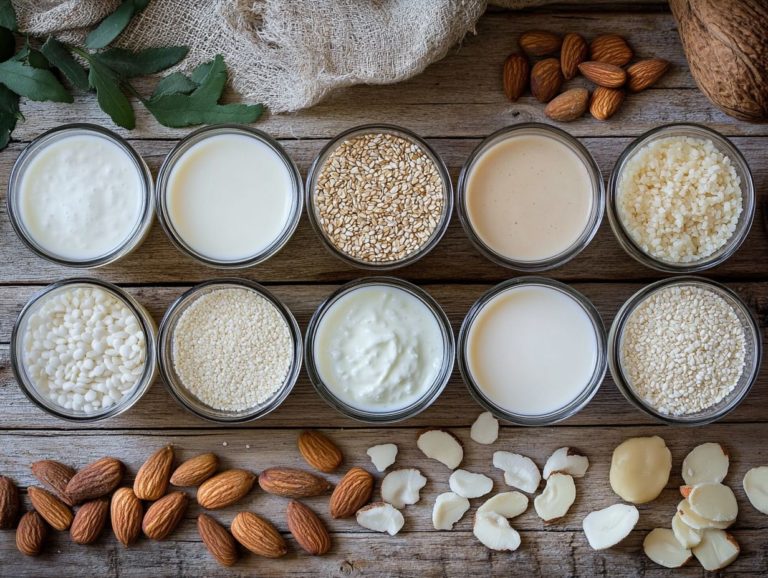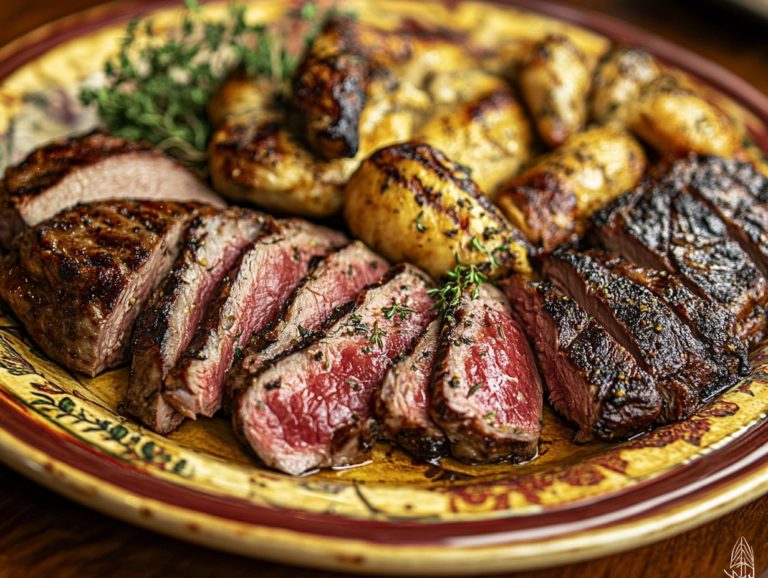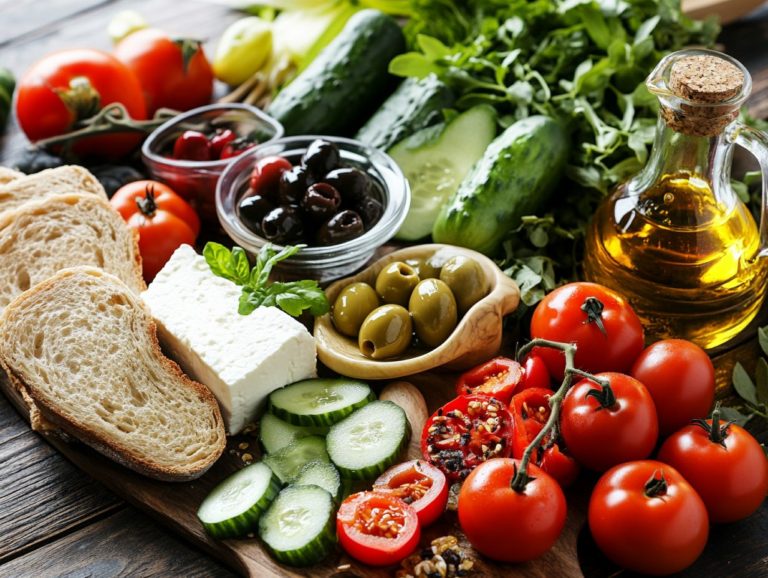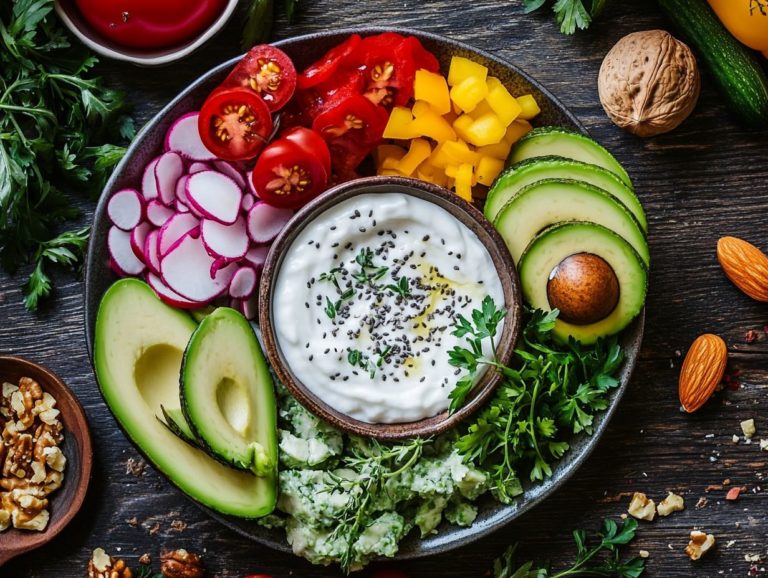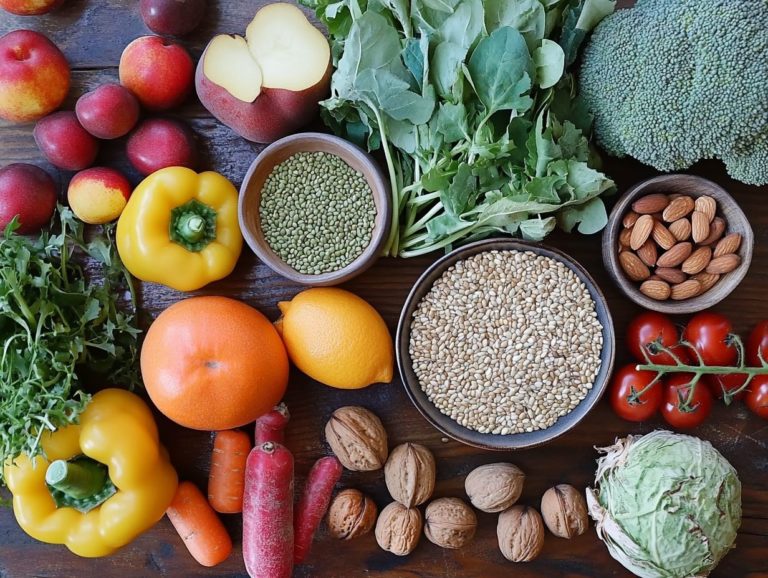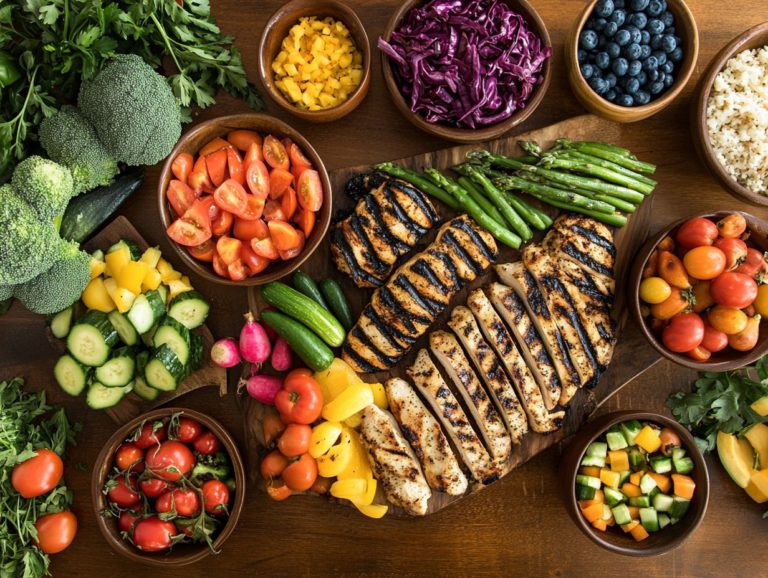The Concept of a Balanced Vegan Diet
A balanced vegan diet goes beyond just avoiding animal products. It’s about enriching your body with a variety of plant-based foods.
This article explores what a vegan diet truly is. It emphasizes how balance is key to meeting your nutritional needs.
You ll find practical tips for meal planning and grocery shopping. We’ll also discuss the many health benefits of a well-rounded plant-based lifestyle.
Common challenges will be revealed, along with effective solutions to empower you on your vegan journey. Dive in to learn how to create a fulfilling and nutritious vegan diet that supports your health.
Contents
- Key Takeaways:
- Understanding a Balanced Vegan Diet
- Nutritional Needs of a Vegan Diet
- Planning a Balanced Vegan Diet
- Possible Health Benefits of a Balanced Vegan Diet
- Challenges and Solutions for Maintaining a Balanced Vegan Diet
- Frequently Asked Questions
- What is the concept of a balanced vegan diet?
- Why is balance important in a vegan diet?
- What are some key nutrients to consider when following a balanced vegan diet?
- Can a balanced vegan diet provide enough protein?
- Do I need to take supplements on a balanced vegan diet?
- How can I ensure I am following a balanced vegan diet?
Key Takeaways:
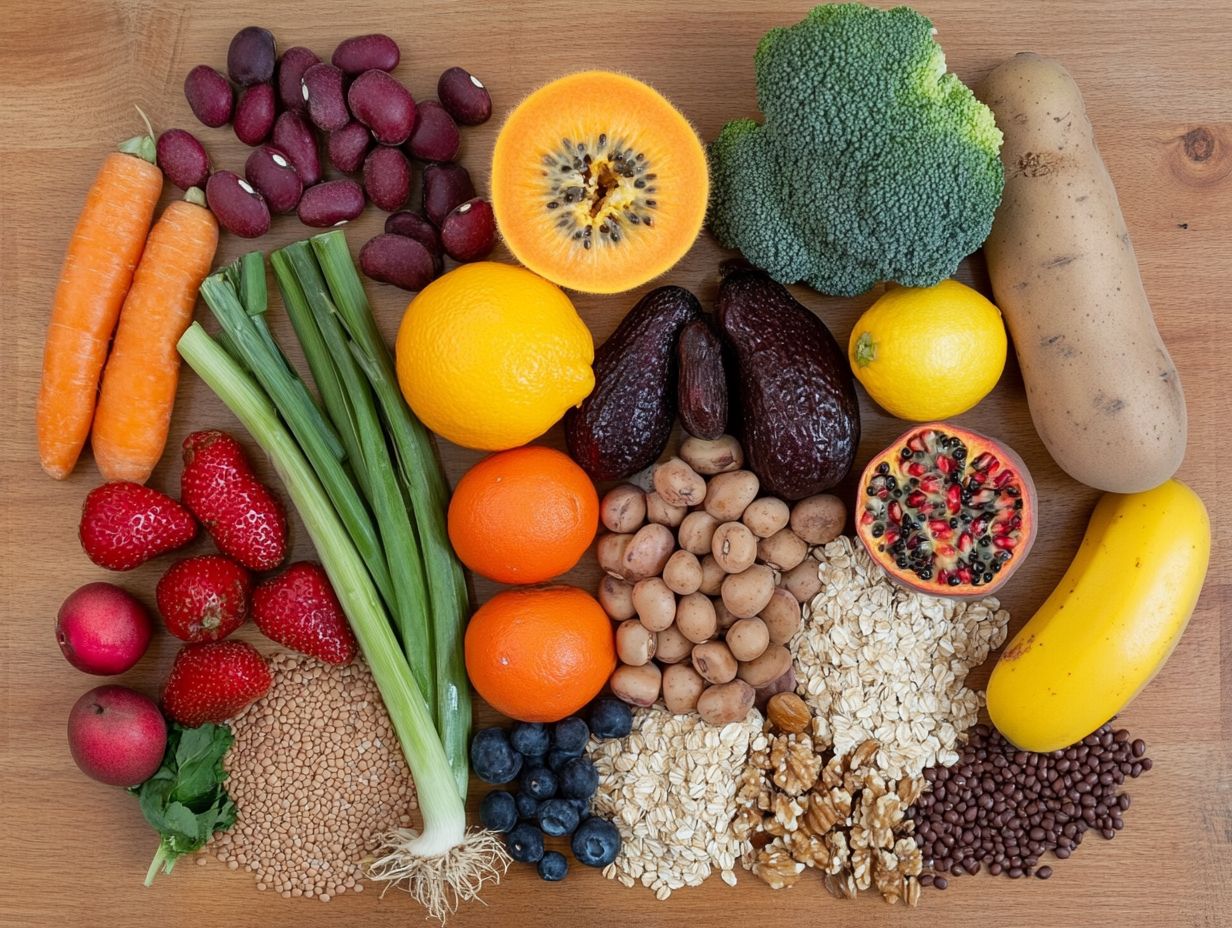
A balanced vegan diet can provide all essential nutrients, but it requires careful planning. Meal planning and grocery shopping are crucial for a healthy vegan diet.
A well-planned vegan diet can lead to improved health and may help prevent diseases.
Understanding a Balanced Vegan Diet
A balanced vegan diet is vital for your health. It emphasizes a wide range of plant-based foods to meet your nutritional needs without animal products.
This diet includes foods that have added nutrients like calcium, vitamin D, and iron. These are essential to prevent common deficiencies.
Understanding how to eat a well-rounded vegan diet allows you to enjoy healthy meals. It ensures you get the vitamins and minerals needed for optimal body functions.
What is a Vegan Diet?
A vegan diet excludes all animal-derived foods. It focuses on a colorful variety of plant-based options like fruits, vegetables, grains, nuts, and legumes.
This lifestyle encourages whole foods that are packed with essential nutrients, including vitamins, minerals, and fiber. These nutrients significantly benefit your health.
Unlike vegetarian diets, which may include dairy and eggs, veganism strictly avoids all animal products. This choice reflects a commitment to animal rights and environmental sustainability.
Embracing this lifestyle can bring numerous health benefits. You might find a lower risk of chronic diseases like heart disease, diabetes, and some cancers.
Plus, you could experience increased energy and better digestion. These are just a few advantages of eating a variety of plant-based foods.
Importance of Balance in a Vegan Diet
Balance in a vegan diet is crucial to prevent nutrient deficiencies. It also fosters a healthy eating experience.
As you adopt a plant-based lifestyle, ensure you include a variety of foods rich in protein, iron, calcium, and vitamins B12 and D.
Neglecting food groups like legumes, nuts, whole grains, and leafy greens can lead to imbalances. This might harm your overall health.
Creating a diverse and balanced meal plan is essential for anyone committed to a vegan diet.
Nutritional Needs of a Vegan Diet
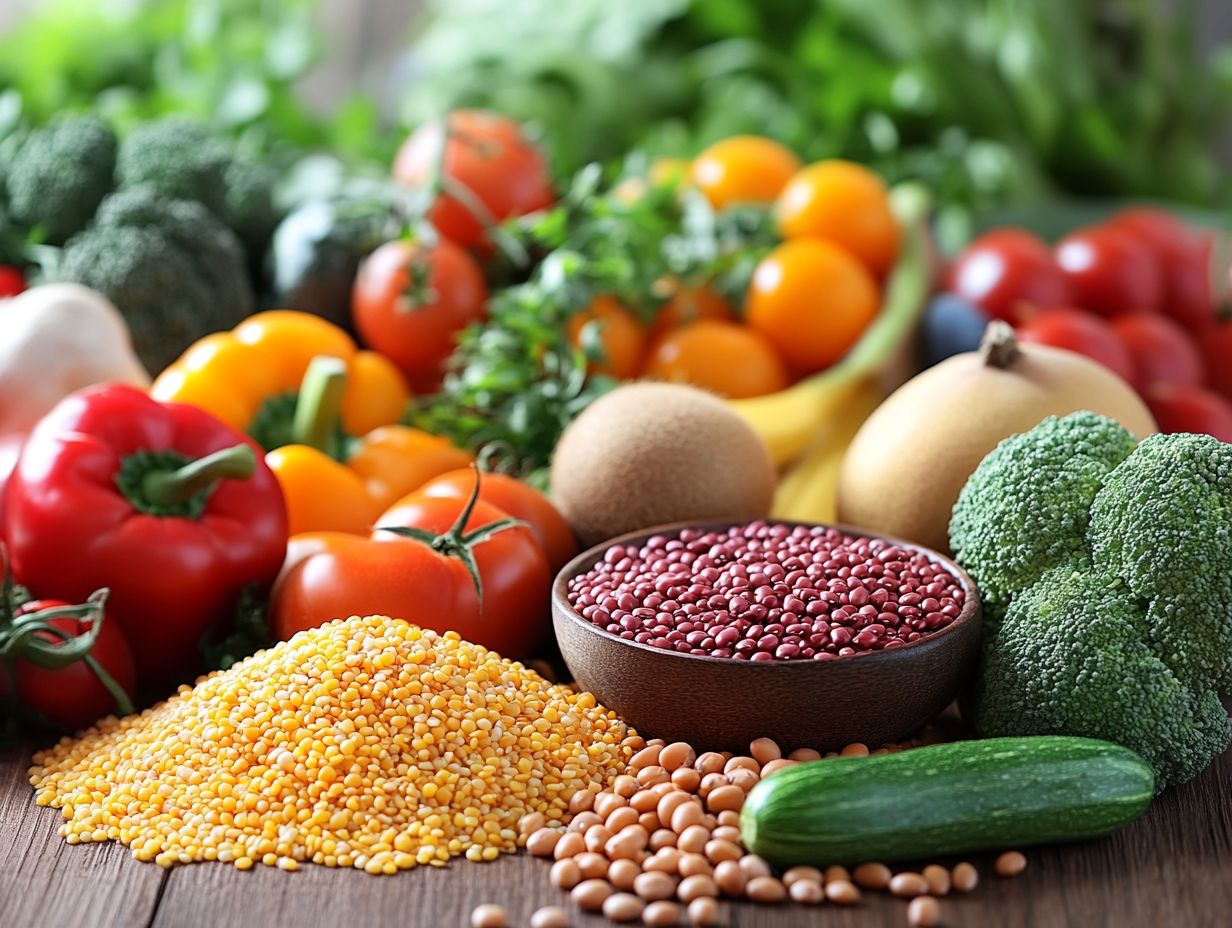
Understanding the nutritional needs of a vegan diet is vital for your health. Pay attention to sources of calcium, vitamin D, iron, and omega-3 fatty acids.
Essential Nutrients to Consider
Essential nutrients in your vegan diet include calcium, vitamin D, iron, and omega-3 fatty acids. Each is vital for your health and well-being.
Calcium is fundamental for building strong bones and teeth. It also supports muscle function and nerve signaling. Good sources for those following a plant-based lifestyle include fortified plant milks, leafy greens like kale, and calcium-set tofu.
Vitamin D is essential for calcium absorption and immune function. You can obtain it from fortified foods, mushrooms exposed to sunlight, and responsible sun exposure. Be mindful of potential deficiencies, as they can compromise your bone health.
Iron is crucial for transporting oxygen in your blood. Plant-based sources like lentils, quinoa, and chickpeas offer ample amounts. Pairing them with vitamin C-rich foods can enhance absorption significantly.
Omega-3 fatty acids are important for heart and brain health. You can source these from flaxseeds, chia seeds, and walnuts. A deficiency can harm your heart and brain health.
Together, these nutrients underscore the necessity of a well-rounded diet for optimal health.
Planning a Balanced Vegan Diet
Planning a balanced vegan diet requires thoughtful meal preparation and strategic grocery shopping. Ensure a diverse intake of fortified foods, whole grains, fruits, and vegetables to meet all your nutritional needs.
Start crafting a delicious and nourishing diet today!
Tips for Meal Planning and Grocery Shopping
When you’re diving into meal planning as a vegan, organized grocery shopping tips are key to maintaining a diverse and healthy plant-based routine.
Begin by creating a comprehensive shopping list that highlights seasonal and locally sourced fruits and vegetables. These choices are often fresher and packed with nutrients.
As you navigate the aisles, read labels carefully. Ensure your pantry staples are fortified with essential vitamins like B12, which is crucial for nerve function and blood cell production, and D.
Incorporating legumes, whole grains, and a variety of nuts and seeds into your weekly meal rotations boosts your nutrient intake and keeps meals intriguing.
Don t underestimate the power of batch cooking. It saves time and reduces food waste, making it easier to enjoy nutritious meals throughout the week.
Possible Health Benefits of a Balanced Vegan Diet
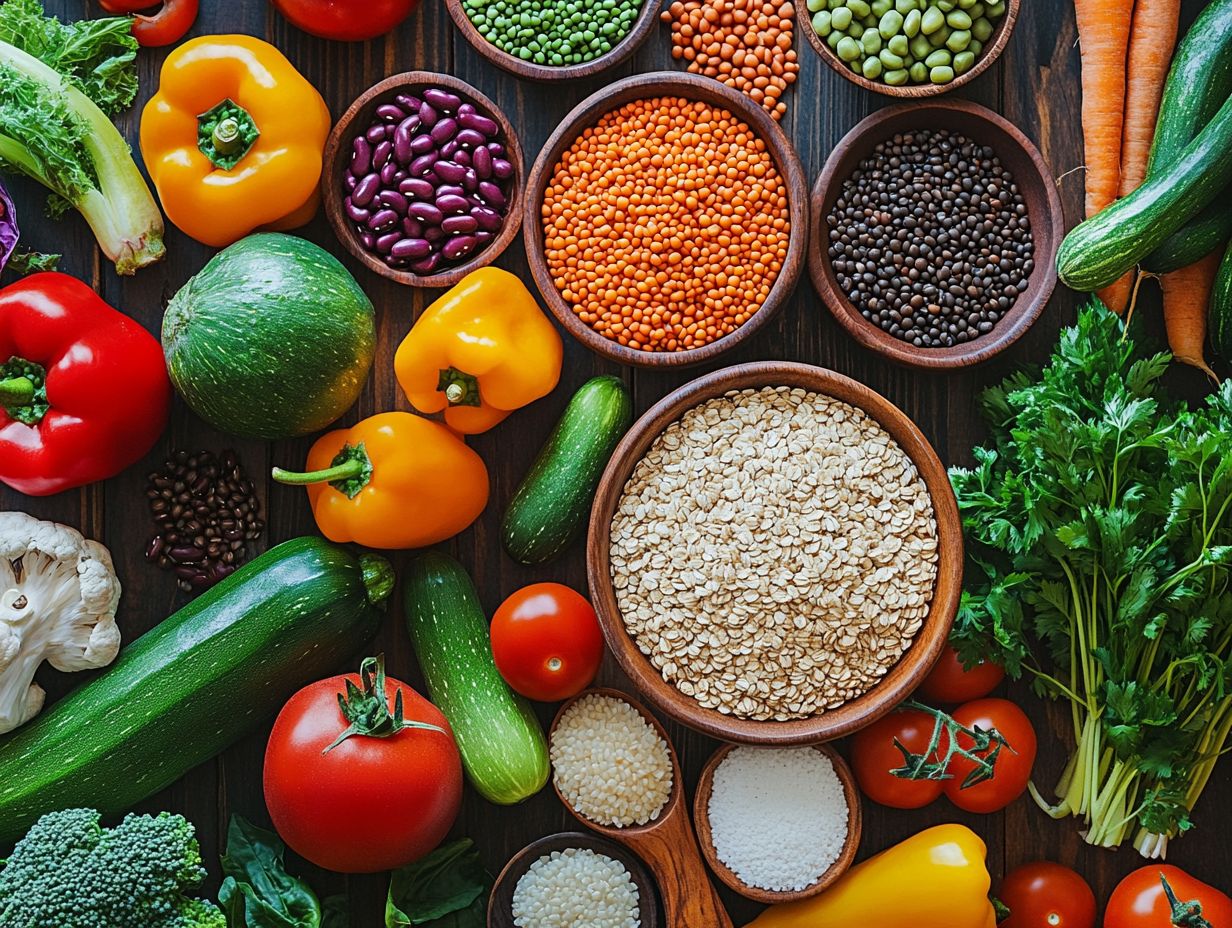
By embracing a balanced vegan diet, you unlock a wealth of health benefits, including enhanced overall well-being and potential disease prevention.
This lifestyle choice is enriched with a vibrant array of vitamins and minerals from plant-based sources, paving the way for a healthier you.
Impact on Overall Health and Disease Prevention
The impact of a balanced vegan diet on overall health and disease prevention is significant. Compelling evidence suggests it may lower the risk of chronic diseases.
Research indicates that a plant-based diet often results in lower cholesterol levels, improved blood pressure, and effective weight management. These factors are essential in preventing heart disease and diabetes.
Studies show that a diet rich in fruits, vegetables, whole grains, and legumes can reduce body mass index (BMI) and enhance metabolic health.
Incorporating fortified foods ensures you receive essential nutrients like vitamin B12 and iron, allowing you to maintain optimal health while enjoying nutrient-rich plant foods.
Thus, a balanced vegan diet promotes vitality and acts as a preventive measure against serious health issues.
Challenges and Solutions for Maintaining a Balanced Vegan Diet
Navigating a balanced vegan diet can come with challenges, such as nutrient deficiencies and the intricacies of meal planning.
However, effective strategies are at your disposal to help you overcome these hurdles.
Join us in exploring the exciting world of delicious vegan meals!
Overcoming Common Obstacles
Maintaining a vegan diet can be challenging. It requires knowledge and proactive strategies to overcome common obstacles, like nutrient deficiencies.
As you transition to a vegan lifestyle, you might face challenges. Limited food choices, especially at social events with mainly non-vegan options, can feel isolating.
Prepare yourself with alternative dishes to ease the strain of these gatherings. Mastering meal prep is essential.
Stock your kitchen with plant-based staples like beans, quinoa, and seasonal vegetables. This will simplify your cooking process.
Understand how to include important vitamins and minerals, like iron and vitamin B12, in your meals. This not only supports your health but also boosts your confidence in your dietary choices.
By exploring diverse recipes and planning your meals, you ll find it much easier to overcome these challenges.
Frequently Asked Questions
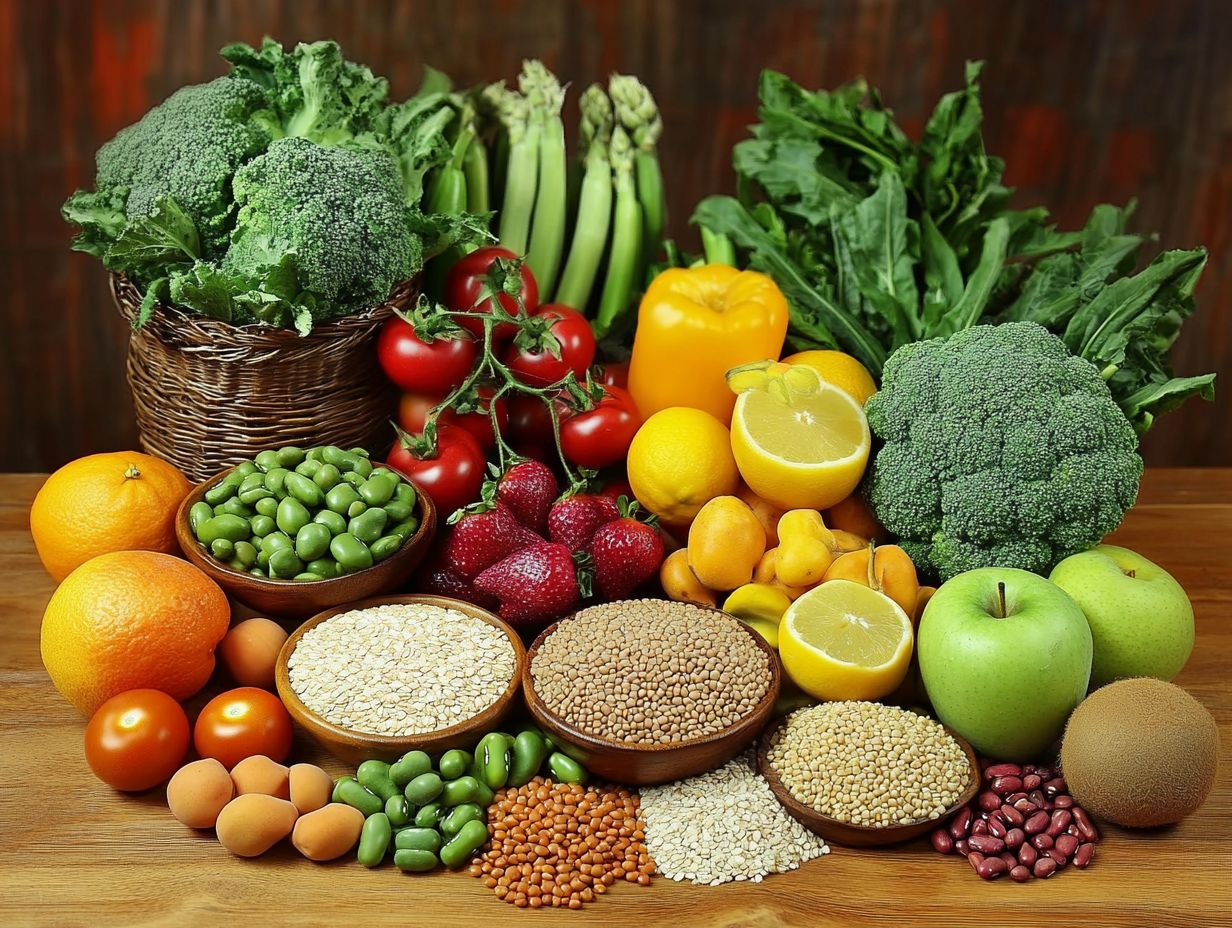
What is the concept of a balanced vegan diet?
A balanced vegan diet includes a variety of plant-based foods. This ensures you get all the necessary nutrients for good health, like fruits, vegetables, grains, legumes, nuts, and seeds.
Why is balance important in a vegan diet?
Balance is key to getting enough essential nutrients. A vegan diet can sometimes lack nutrients like protein, iron, and calcium, so it s crucial to maintain that balance.
What are some key nutrients to consider when following a balanced vegan diet?
Important nutrients to focus on include protein, iron, calcium, vitamin B12, and omega-3 fatty acids. You can find these in plant-based sources, but you ll need to plan your meals carefully.
Can a balanced vegan diet provide enough protein?
Yes, a balanced vegan diet can offer sufficient protein. Beans, lentils, tofu, tempeh, nuts, and seeds are great plant-based protein sources.
Do I need to take supplements on a balanced vegan diet?
It s advisable to take a vitamin B12 supplement on a vegan diet. This vitamin is usually found in animal products. Depending on your needs, other supplements might also be necessary.
How can I ensure I am following a balanced vegan diet?
To maintain a balanced vegan diet, include a variety of whole plant-based foods in your meals. Pay attention to your protein, iron, calcium, and other nutrient intake.
Tracking your food and consulting with a registered dietitian can help keep your diet balanced.

